old1.jpg)
The team embarked on the private train, and food was served, but as the adrenalin of the day wore off, Quartermain was clearly suffering from the pain of his wounds. Leaning over, Holmes handed him a small pill and a glass of water. "This should blunt the pain," he said quietly. Quartermain, used to frontier doctoring for malaria with quinine, swallowed it gratefully and, as the song of the train wheels softened in his ears, drifted gratefully off to sleep.
old1.jpg) |
Three hours later, the train stopped at Carlisle to take on coal and water. Cavendish, Holmes and Churchill disembarked, and Cavendish made straight for the station-master's office. The arrival of so many distinguished gentlemen in his office was enough to unsettle the station-master, although it was Holmes he recognized - being clearly a fan. Normally, this might have chagrined Cavendish but he barely seemed to notice today.
Cavendish siezed the telephone, and after some urgent conversation with the operator managed to get a call placed to Kensington. The line was very poor, and the conversation was short, but it was evident from his face that their worst fears were realized. A simultaneous attack had been made at Kensington; lives had been lost but the line wasn't clear enough for Cavendish to learn any more.
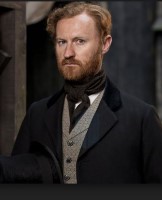 |
Almost distraught, Cavendish rushed out of the office to harry the railway people in preparing the train to start for London. Holmes looked down at the telephone, then picked it up and requested Mycroft's number. This time he was in luck, and his brother was in his office.
"Hello, brother," came Mycroft's educated, know-it-all tones down the line. "Coming back already - haggis not to your taste?" Holmes blinked. "You know," he said. It was not a question. "The Good Knight is not going to be happy," continued Mycroft. "His so-secret headquarters breached and robbed." The brothers rapidly exchanged information, trading details of Arbroath for details of the raid on Kensington. When they ran to a halt, Mycroft's voice turned serious for once. "Do you need help?" he said. "Moriarty is a foe worth fighting."
Back on the train, Holmes spoke to Cavendish. "Your organization leaks like a colander," he said flatly. "Every time we do something, they know." Holmes' money - and Quartermain's - would have been on Horton, but now he was in a Scottish morturary with somebody's bullet behind his eyeballs, it was unlikely he would do it any more.
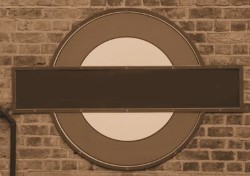 |
Finally the train drew into the secret station under Kensington. It was instantly apparent that there had been trouble; one of the small armoured doors had been blasted open, and scorch marks and bullet pocks were visible on the walls. Several dark smears on the floor suggested that casualties had been taken on one side or another.
As soon as the train came close to a halt, Cavendish was off and walking rapidly towards the entrance to the base. Colonel Galbraith, o/c troops at the base, saluted smartly as the knight walked towards him, but didn't get more than two words out before Cavendish had passed without even looking at him and disappeared into the base, Churchill hard on his heels.
To the side, Quartermain - rested after sleeping through the train ride but high as a kite - dropped to one knee and started examining some bloody boot-prints on the platform.
Nonplussed, he turned back to find Holmes waiting for him. "Any prisoners?" asked the detective. Galbraith, relieved to find someone who seemed to be paying attention, straightened up. "No, sir," he said, "only corpses." Holmes glanced at Quartermain. "Report to the MO," he said, then returned to Galbraith. "Show me," he said.
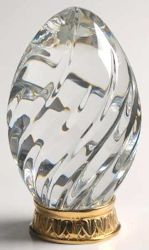 |
Further into the base, Cavendish and Churchill had reached Cavendish's office. Signs of intense fighting had marked their way, noticably absent from any of the side turnings. Whoever had fought their way in here had known where they were going. Largely undisturbed, Cavendish's quarters had a picture removed from the wall, and the safe behind it expertly opened. It gaped empty, and Cavendish groaned and dropped into a chair dejectedly.
"What was in there?" asked Churchill, knowing the answer. "The Crystal Egg," said Cavendish miserably. "Who knew that?" asked Churchill. "Myself, Horton, some of the senior science staff." Churchill glanced around the well-kept quarters. "Servants?" he asked. Cavendish waved a hand dismissively. "They come in and work," he said, clearly not considering them important.
Leaving Cavendish in his chair staring at nothing, Churchill backed out and walked across to Horton's quarters. While Cavendish's were characterized by a rather comfortable upper-class clutter, Horton's were precisely, almost obsessively neat. Peeking behind pictures, Churchill located a similar safe, but a glance was enough to show that he had no chance of opening it. Leaving, he went to find Galbraith and get a full account of the events.
—Holmes, "The Final Problem" - But in calling Moriarty a criminal you are uttering libel in the eyes of the law—and there lie the glory and the wonder of it! The greatest schemer of all time, the organizer of every devilry, the controlling brain of the underworld, a brain which might have made or marred the destiny of nations—that’s the man! But so aloof is he from general suspicion, so immune from criticism, so admirable in his management and self-effacement, that for those very words that you have uttered he could hale you to a court and emerge with your year’s pension as a solatium for his wounded character. Is he not the celebrated author of The Dynamics of an Asteroid, a book which ascends to such rarefied heights of pure mathematics that it is said that there was no man in the scientific press capable of criticizing it? Is this a man to traduce? Foulmouthed doctor and slandered professor—such would be your respective roles! That’s genius, Watson. —Holmes, The Valley of Fear |
Outside Cavendish's quarters, Holmes and Quartermain met up. The hunter was not looking good; his face was dotted with sweat. "Same boots," he said briefly, referring to the prints on the platform which matched the ones he'd seen in Scotland. Holmes nodded, and firmly directed Quartermain to the infirmary before entering Cavendish's quarters.
It didn't take long for him to bundle the knight out; after all if you're going to hire a detective, you might was well let him work. Once alone, he examined the safe carefully, taking a sample of the explosive residue to send for analysis. He then also examined Horton's room, noticing that it there were several hidden spaces set out for hiding things - behind drawers, in light fittings, and so on - but all were empty.
Descending to the lowest level, he discovered without surprise that the attackers had penetrated to the prison quarters, and that the captive Martian was gone. Both its' guards were dead, and one had been fed upon.
Locating a telephone, he sent a telegram to an address on London's East Side and told the front-men in the bookshop frontage to expect a specialist contractor. While he waited, he located Churchill and they compared notes.
Churchill was strongly in favour of mind control - although he didn't say so, as a result of his uncomfortable telepathic brush with the Martians. "If so," he said, thinking carefully, "then the 'rescuers' were controlled by Martians, too," Holmes frowned. "No-one controls Moriarty," he said with absolute conviction. "He controls people." At that moment, a servant arrived to tell Holmes that his "guest" was waiting in the bookshop.
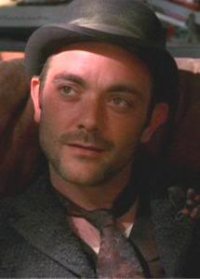 |
On arriving, they discovered a small man in a greasy suit and shabby bowler, with a cocky expression, and whose face lit up at the sight of Holmes. "Mister 'Olmes!" he said cheerfully. "Got anyfink good for me, guv?" Churchill looked at him dubiously, but Holmes shook hands with the reprobate calmly. "Billy the Wrist. Thank you for coming. Yes, a job for your specialist talents, for which you will be handsomely renumerated if you stick to the job at hand." Billy chuckled. "You do like to tike the fun out of everyfing, don'cha?" he said. "Rightho - lead on."
Rather to Churchill's surprise and alarm, Holmes led Billy to Horton's quarters and pointed at the safe. "Open that, if you please," he said. Billy chuckled. "Wot a nice piece o'work!" he said admiringly. "Owner of this wanted his stuff safe, an' no mistaik." Unrolling his tools, he whistled cheerfully as he worked, and in a depressingly short space of time, had unlocked the safe. He was just starting to swing the door open when Holmes placed a hand on it. "That's fine, Billy," he said. "Thank you for your assistance, and here's for your trouble." Several sovreigns appeared in his other hand as if by magic, and he handed them to the cracksman. "And remember..." he prompted. Billy grinned broadly. "I never 'eard of you, and I've no idea where I am," he said readily.
Once the cracksman was safely off the premises, Churchill wandered off to find Galbraith and help restoring order, while Holmes investigated the contents of the safe. As expected, he found Horton's papers, including his passport, and several boxes of cartridges for his revolver stacked neatly at the back. There was also a false passport and identity in the name of a John Taylor, and Holmes took these. He also took four small notebooks, identical to the one Quartermain had retrieved from Horton's corpse, filled with the same ciphered notes. Pocketing these, he carefully closed the safe and checked that no signs of the intrusion had been left.
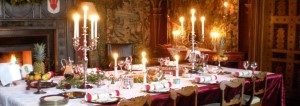 |
Over the week of Christmas, Holmes arranged for lab analysis of his samples, and also of various equipment and samples from the dead attackers, who looked remarkably similar in dress and appearance to the French commandos who'd assaulted Arbroath.
Quartermain had responded well to treatment; Dr Meredith had successfully extracted the bullet from his shoulder and a week of bed-rest had seen him well on the road to recovery. He'd had chance to examine the dead attackers in the first day, and their boots did indeed match the tracks he'd noted. To complete the process, Churchill invited him home to his family seat for the Christmas period. He invited Holmes and Smith as well, but the former had little use for Christmas, and the latter preferred to spend his quietly with his wife.
Holmes spent the time going over correspondence and working with Mycroft. The latter had discovered the movements of the attackers of Kensington without much trouble. They had arrived in England by ferry to Hull, travelled to London by train and taken rooms. The landlord reported them as "well spoken forrin gen'nlmen" with heavy bags, who'd stayed several days and kept to themselves. One morning they had gone out and not come back. Cavendish's people had managed to get this far, but only Mycroft had managed to uncover their tracks after the raid. In completely different disguises, they had made their way to the Dover-Calais ferry, equipped with papers identifying them as sales representatives for a Midlands tractor manuacturer and bearing a large box marked "tractor spares". Interestingly, none of the witnesses described them as foreign.
He had also spent a considerable time working on the cipher in which Horton's notebooks were written. Fiendishly complicated though it was, it was no match for Holmes' mighty brain, and soon he was able to begin extracting information from it. What he discovered was startling. Horton had been watching and chronicling Cavendish's activities for years, far back before the Martian War, to a degree that could only be described as espionage, despite the complete lack of any detail as to where the information was being sent.
When the investigators returned to duty after Christmas, it was to find the base repaired and tidied, and Cavendish restored to something approaching his old manner, though more driven than hitherto. He had, he said, some good news to impart. Chief Engineer Warburton had completed the construction of what Churchill had christened the Earth Walkers - the French having bypassed the levels on which their workshops were stored.
A test site had been picked out in a secluded small bay on the edge of Southport Beach, and the machines had already been shipped up there to be assembled and tested. Cavendish requested that the Investigators should go as his representatives to supervise the test, and report back to him on what they should find.
As they boarded the train, it occurred to them that this was the first time Cavendish had passed up the chance to be in at the front when something impressive or successful was being done; it was atypical of the man. With anyone else, sorrow over his lost assistant would be a likely cause, but Cavendish had shown no more effects from Horton's death than from that of any of the soldiers slain in the attacks.
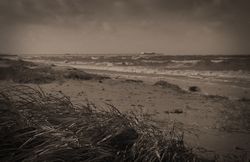 |
As they gathered on a bleak, windswept beach, Warburton introduced them to the man in charge of the trainee Earth Walker drivers; a slim, dark-featured young Artilleryman with an intense manner named David Blake.
He and Smith clearly knew each other and shook hands in the manner of those who had shared much together. “The man from Maybury Hill!” said Blake, “here we are again, and me promoted to Sergeant – ain’t that a go?”
The site chosen was a rather secluded cove, and the Army had sealed it off from the public. The five Earth Walkers had been unloaded from their heavy lorries and were sitting with folded legs on the sand, getting steam up. Warburton explained that, though the Martian power plants were a mystery, he had managed to get them to work reliably to heat water for steam – hence the Earth Walker didn’t need a firebox or fuel. It took half an hour to steam up and load the gun and ammo on each Earth Walker, after which they were ready.
Holmes declined to have anything to do with the things, and retired to the car, where he worked away on Horton's cipher out of the wind. Quartermain remained outside, watching with interest, but Churchill threw himself into the project with enthusiasm, climbing into the Earth Walker's wood, leather and brass cockpit and listening carefully to the engineers' instructions. When all were ready, Blake gave the word, and the machines lurched to their normal height.
After some initial slapstick driving, the new drivers had mastered the basics and were stomping backwards and forwards with some confidence. Warburton signaled that it was time for target practice; several steel buoys had been set up in the water, painted bright red (of course!) for them to shoot at. The trainees blazed away with the heavy guns, the discharge rocking their cockpits, and eventually scoring one or two hits.
While this was happening, something caught Quartermain's eye - a movement in the dune grass, at first like that of an animal. A moment later, five Remote Walkers stamped out of the dunes, heading for the sea, and laying about them with their Heat Rays. Unfortunately for them, the Earth Walkers were nicely warmed up and ready for action, and 3" shells were soon erupting around the Martian machines. Quartermain grinned; this time, his heavy holdall was right at his feet, and he stooped quickly, siezing the .303 rifle he somehow hadn't got around to returning to the Army. Drawing a bead, he lined one up and shot it, sending it staggering and slowing its' headlong dash for the water. Working the bolt, he fired again, this time blowing all the way through the "body" of the thing and throwing a red smear across the sand.
Further up the beach, Churchill swung the hood of his Walker around towards a movement he'd noticed. Two more Walkers were dashing flat-out for the water. Taking careful aim, he dropped a shell neatly between them, blasting both to fragments. No more seemed to be visible, so Churchill and Quartermain followed the tracks back, to discover that the machines had come from the sea, swung around and approached the test side from landward.
Churchill looked down at the water from the vantage of his walker, then glanced at the rubber seal around the cockpit door. The things were said to be waterproof, but he had no idea how much air it contained and how long it would last, nor what he would do once immersed - tracks were unlikely to be visible underwater..
Session Date: 30th April 2015 |